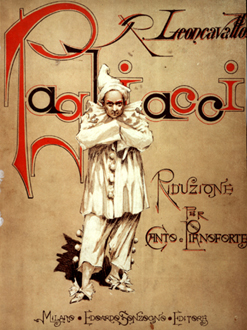Leoncavallo, Vesti la giubba
Ridi, Pagliaccio. Laugh, Pagliaccio, your love is broken.
 It may be one of the most iconic lines and melodies in opera. If you want to conjure up the high emotional drama of opera in your soundtrack, commercial, or cartoon, you just need a few seconds of this aria, Vesti la giubba, from I Pagliacci by Ruggero Leoncavallo (1857-1919). For example.
It may be one of the most iconic lines and melodies in opera. If you want to conjure up the high emotional drama of opera in your soundtrack, commercial, or cartoon, you just need a few seconds of this aria, Vesti la giubba, from I Pagliacci by Ruggero Leoncavallo (1857-1919). For example.
I Pagliacci, premiered in 1892, is one of the prime examples of verismo in opera along with Mascagni’s Cavalleria rusticana (1890) and Puccini’s Tosca (1900). Verismo, meaning true, involved a shift from stories about royalty and gods to common people and their more or less common problems. Romance, jealousy, infidelity, and violence tend to drive the plots. The music serves the drama. It is through-composed—not divided into separate arias and recitatives.
In Vesti la giubba (put on your costume) at the end of Act I, the clown Pagliaccio has discovered his wife’s infidelity with another member of the commedia dell’arte troupe.
I declaim! While taken with delirium,
I do not know what I am saying,
or what I am doing!
Yet it is necessary, I must force myself!
Bah! Are you not a man?
Thou art Pagliacci (clown)!
Put on your costume and apply makeup to your face.
The people pay, and they want to laugh.
And if Harlequin invites away Colombina
laugh, Pagliaccio (clown), and everyone will applaud!
Turn the spasms and tears into jokes,
The tears and pain into grimaces, Ah!
Laugh, Pagliaccio (clown),
your love is broken!
Laugh at the pain, that poisons your heart!
Leoncavallo gained recognition initially for his tone poem La nuit de Mai in 1886. Pagliacci was his first major success—one that he never quite escaped. It remains the primary, perhaps single, work for which he is known despite writing some 20 operas and operettas. He had some success with his opera La bohème in 1897, but Puccini’s La bohème of 1896 overshadowed it.



